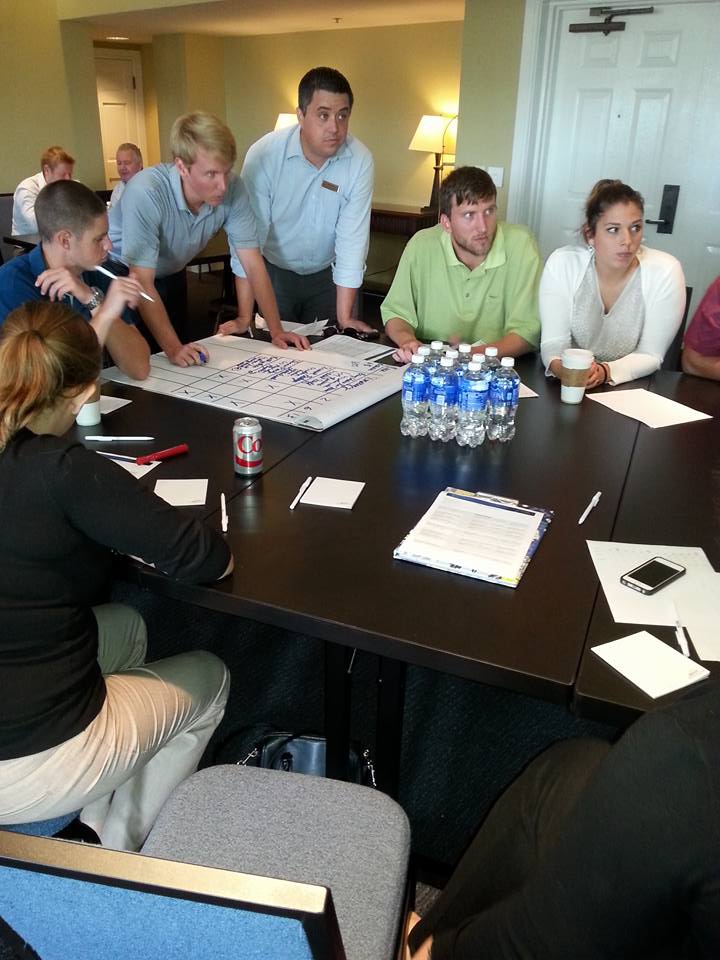
The buzz words among university faculty and administrators these days is the term engaged learning. The premise is that most students learn more by doing than by sitting in a classroom. Engaged learning allows students to actively participate in the learning process, interact with peers, faculty and often, industry partners, and then supplement traditional classroom style teaching with “real world” experience.
Engaged learning opportunities such as internships have long been a part of the degree requirements for diplomas in the recreation, park and tourism fields. For many, the internship is the capstone learning experience and the definition of engage learning; twelve to fifteen weeks or longer spent working away from the university, under the direction supervision of a professional in the field. Recent trends in university course offerings show that engaged learning opportunities are increasing in type and style and are available to students in advance of the capstone internship opportunity.
According to the
Association of American Colleges and Universities, engaged learning has several characteristics that differentiate it from what, back in the day, many of us called experiential learning. Engaged learning suggests that students are active participants in the learning process as well as in the object of study. Engaged learning means that students are also engaged in the context of the object of study as well as with the human condition.
Engaged learning can range from everything from an assignment that requires students to interview a professional in the field to group oriented, project based assignments to a faculty led study abroad experience.
In the Recreation, Park and Tourism Management (RPTM) department at Penn State, we have spent considerable time and resources developing specialized engaged learning opportunities for students in each of the career options within the major. For example, our Arena Management course is taught at Penn State’s Bryce Jordan Center – a 15,000 seat sports and entertainment facility – with staff from the arena helping students gain hands-on experience in marketing, ticketing, facilities operation, booking, etc. We have partnered with commercial recreation entities such as Marriott Vacation Club and Carnival Cruises to offer embedded travel courses in which students complete projects under the direction of the recreation management teams of those companies and then the students spend a week during the semester working at the resorts or on a cruise ship. Our People and Parks program, in conjunction with the Department of Landscape Architecture, takes students to Tanzania to participate in a variety of interdisciplinary scholarly activities related to the national parks and the surrounding communities. Bi-annually, our golf management students have the opportunity to enroll in a class over Spring Break that takes them to the birthplace of golf – St. Andrews, Scotland. Most recently, we adapted several sections of the introduction course Leisure and of any major) by reducing enrollment in each section and including off campus visits to recreation agencies throughout Pennsylvania. Penn State’s affiliate nature center, Shaver’s Creek Environmental Center, continues to offer a variety of RPTM courses that offer engaged learning opportunities for students interested in outdoor education, park management and environmental interpretation.
The days of students taking notes in a large lecture hall while an instructor teaches from a podium are becoming a thing of the past. Engaged learning and hands-on education with students actively participating is the way of the future.
 The buzz words among university faculty and administrators these days is the term engaged learning. The premise is that most students learn more by doing than by sitting in a classroom. Engaged learning allows students to actively participate in the learning process, interact with peers, faculty and often, industry partners, and then supplement traditional classroom style teaching with “real world” experience.
Engaged learning opportunities such as internships have long been a part of the degree requirements for diplomas in the recreation, park and tourism fields. For many, the internship is the capstone learning experience and the definition of engage learning; twelve to fifteen weeks or longer spent working away from the university, under the direction supervision of a professional in the field. Recent trends in university course offerings show that engaged learning opportunities are increasing in type and style and are available to students in advance of the capstone internship opportunity.
According to the Association of American Colleges and Universities, engaged learning has several characteristics that differentiate it from what, back in the day, many of us called experiential learning. Engaged learning suggests that students are active participants in the learning process as well as in the object of study. Engaged learning means that students are also engaged in the context of the object of study as well as with the human condition.
Engaged learning can range from everything from an assignment that requires students to interview a professional in the field to group oriented, project based assignments to a faculty led study abroad experience.
In the Recreation, Park and Tourism Management (RPTM) department at Penn State, we have spent considerable time and resources developing specialized engaged learning opportunities for students in each of the career options within the major. For example, our Arena Management course is taught at Penn State’s Bryce Jordan Center – a 15,000 seat sports and entertainment facility – with staff from the arena helping students gain hands-on experience in marketing, ticketing, facilities operation, booking, etc. We have partnered with commercial recreation entities such as Marriott Vacation Club and Carnival Cruises to offer embedded travel courses in which students complete projects under the direction of the recreation management teams of those companies and then the students spend a week during the semester working at the resorts or on a cruise ship. Our People and Parks program, in conjunction with the Department of Landscape Architecture, takes students to Tanzania to participate in a variety of interdisciplinary scholarly activities related to the national parks and the surrounding communities. Bi-annually, our golf management students have the opportunity to enroll in a class over Spring Break that takes them to the birthplace of golf – St. Andrews, Scotland. Most recently, we adapted several sections of the introduction course Leisure and of any major) by reducing enrollment in each section and including off campus visits to recreation agencies throughout Pennsylvania. Penn State’s affiliate nature center, Shaver’s Creek Environmental Center, continues to offer a variety of RPTM courses that offer engaged learning opportunities for students interested in outdoor education, park management and environmental interpretation.
The days of students taking notes in a large lecture hall while an instructor teaches from a podium are becoming a thing of the past. Engaged learning and hands-on education with students actively participating is the way of the future.
The buzz words among university faculty and administrators these days is the term engaged learning. The premise is that most students learn more by doing than by sitting in a classroom. Engaged learning allows students to actively participate in the learning process, interact with peers, faculty and often, industry partners, and then supplement traditional classroom style teaching with “real world” experience.
Engaged learning opportunities such as internships have long been a part of the degree requirements for diplomas in the recreation, park and tourism fields. For many, the internship is the capstone learning experience and the definition of engage learning; twelve to fifteen weeks or longer spent working away from the university, under the direction supervision of a professional in the field. Recent trends in university course offerings show that engaged learning opportunities are increasing in type and style and are available to students in advance of the capstone internship opportunity.
According to the Association of American Colleges and Universities, engaged learning has several characteristics that differentiate it from what, back in the day, many of us called experiential learning. Engaged learning suggests that students are active participants in the learning process as well as in the object of study. Engaged learning means that students are also engaged in the context of the object of study as well as with the human condition.
Engaged learning can range from everything from an assignment that requires students to interview a professional in the field to group oriented, project based assignments to a faculty led study abroad experience.
In the Recreation, Park and Tourism Management (RPTM) department at Penn State, we have spent considerable time and resources developing specialized engaged learning opportunities for students in each of the career options within the major. For example, our Arena Management course is taught at Penn State’s Bryce Jordan Center – a 15,000 seat sports and entertainment facility – with staff from the arena helping students gain hands-on experience in marketing, ticketing, facilities operation, booking, etc. We have partnered with commercial recreation entities such as Marriott Vacation Club and Carnival Cruises to offer embedded travel courses in which students complete projects under the direction of the recreation management teams of those companies and then the students spend a week during the semester working at the resorts or on a cruise ship. Our People and Parks program, in conjunction with the Department of Landscape Architecture, takes students to Tanzania to participate in a variety of interdisciplinary scholarly activities related to the national parks and the surrounding communities. Bi-annually, our golf management students have the opportunity to enroll in a class over Spring Break that takes them to the birthplace of golf – St. Andrews, Scotland. Most recently, we adapted several sections of the introduction course Leisure and of any major) by reducing enrollment in each section and including off campus visits to recreation agencies throughout Pennsylvania. Penn State’s affiliate nature center, Shaver’s Creek Environmental Center, continues to offer a variety of RPTM courses that offer engaged learning opportunities for students interested in outdoor education, park management and environmental interpretation.
The days of students taking notes in a large lecture hall while an instructor teaches from a podium are becoming a thing of the past. Engaged learning and hands-on education with students actively participating is the way of the future.

